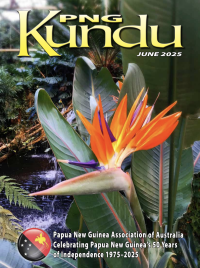15. The comparison with Quislings and collaborators elsewhere
Paul Quinlivan’s Snapshots
In previous Snapshots I have described certain roneoed sheets so that, if you come across one when clearing out an old collection of papers, you will think twice before you throw it out as useless junk. But, since most will never have to do that kind of sorting, we will now deal with matters where the reference is in the public domain. The first is brought to mind by the statesmanlike attitude of the leaders of both sides in East Timor. In Europe after World War II there was an attitude that, in addition to the hunting down of murderers, rapists and other war criminals, very ordinary people who had ‘fraternised’ with the Occupiers in any way should have their heads shaved so that they could be deprived of their livelihood. In TPNG the attitude was very different, as can be seen from The Barry Report (dated 2 August 1945) which recommended that War Damage Compensation be paid to Papua New Guineans for canoes, houses, cooking pots and other items damaged, taken or destroyed as a result of the war. At page 26 we read this:
76. The views of Chief Judge Phillips command our full assent and concurrence. He writes – “Let me take the case of the Natives… In the middle eighties of the last century they were subjected for the first time, and for reasons beyond their ken, to government by Europeans – the Germans. They found, after some disastrous clashes, that the newcomers were too strong to be resisted. After approximately thirty years of German rule the Germans were, for reasons unknown to the Natives, conquered and supplanted by Australians who bore arms and whose governance it was hopeless to refuse to accept. After nearly thirty years of Australian rule, the Australians, again for reasons quite unknown or unappreciated by the Natives, were ousted by the Japanese. With negligible exceptions these Natives had never been outside their islands and had no conception whatever of world politics, or of the size, strength, population and resources of other countries. They therefore completely lacked the knowledge and experience which might have enabled them to judge just when a de facto government should be recognised as one de jure, a question which even enlightened European governments have found embarrassing … It is submitted that Natives who, at the point of the bayonet or under other enemy duress, have led the enemy to an aerodrome or landing site or along a road cannot fairly be classed as “collaborators”.
77. We consider that Natives who are alleged to have actively assisted the Japanese should be interrogated by the Director of District Services and Native Affairs. Unless he is satisfied beyond reasonable doubt that in so acting they did so voluntarily and without coercion or duress and with a realization that it was wrong to do so, they should be entitled to come within the compensation scheme.”
The result was that, in addition to normal patrols and those for special purposes (eg chasing suspect murderers, immunising whole populations in the anti-yaws campaign, etc.) a minimum of three patrols went out into every area which might conceivably have been affected by the war: one to tell them the good news, the second to find out what was being claimed, and the third to cover items forgotten or people missed out on earlier patrols. It was a way of saying, “We are back. The war is finished,” and this simple (but unfortunately forgotten) fact had much to do with the wonderful spirit of inter-racial harmony and trust which was so impressive in those days.



